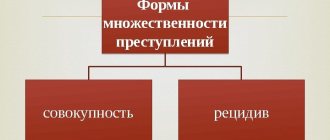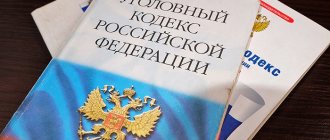1. When assigning punishment for a recidivism, dangerous recidivism or especially dangerous recidivism of crimes, the nature and degree of public danger of previously committed crimes, the circumstances due to which the corrective effect of the previous punishment turned out to be insufficient, as well as the nature and degree of public danger of newly committed crimes are taken into account.
2. The term of punishment for any type of recidivism of crimes cannot be less than one third of the maximum term of the most severe type of punishment provided for the crime committed, but within the sanction of the relevant article of the Special Part of this Code.
3. In case of any type of recidivism of crimes, if the court has established mitigating circumstances provided for in an article of this Code, the term of punishment may be assigned less than one third of the maximum term of the most severe type of punishment provided for the crime committed, but within the sanction of the relevant article of the Special Part of this Code , and in the presence of exceptional circumstances provided for in an article of this Code, a more lenient punishment than provided for this crime may be imposed.
- Article 67. Imposition of punishment for a crime committed in complicity
- Article 69. Imposition of punishment for a combination of crimes
Commentary to Art. 68 of the Criminal Code of the Russian Federation
The Criminal Code of the Russian Federation establishes that a person convicted of committing a crime is considered to have a criminal record from the day the court’s conviction enters into legal force until the criminal record is expunged or removed; a criminal record in accordance with the Criminal Code of the Russian Federation is a necessary condition for recognizing a recidivism of a crime and is taken into account when assigning punishment (Part 1 of Article 86).
A criminal record, therefore, represents the legal status of a person, conditioned by the fact of conviction and sentencing to him by a court verdict for a crime committed and entailing the legal consequences established by criminal law if this person commits a crime again; an outstanding or unexpunged criminal record that a person has gives rise to special public legal relations with the state that are formed on the basis of criminal law regulation, which, when this person commits new crimes, serve as the basis for assessing his personality and the crimes he has committed as having an increased public danger and therefore presupposes application of more stringent criminal liability measures to him.
Allowing by virtue of Part 3 of Art. 55 of the Constitution of the Russian Federation in relation to persons with a criminal record, the possibility of establishing by federal law certain additional burdens that remain for a reasonable period of time after they have served their criminal sentence, which are determined, among other things, by the public danger of such persons, are adequate to it and are associated with the obligation to bear responsibility for guilty behavior The Constitution of the Russian Federation, at the same time, requires unconditional compliance with the guarantees of the individual it provides and is based on the need to ensure the fairness of the relevant restrictions and their proportionality to the protected constitutional values. This presupposes the establishment of public legal liability only for a guilty act and its differentiation depending on the severity of the act, the size and nature of the damage caused, the degree of guilt of the offender and other significant circumstances that determine the individualization of punishment.
———————————
See: Resolution of the Constitutional Court of the Russian Federation of March 19, 2003 N 3-P // Bulletin of the Constitutional Court of the Russian Federation. 2003. N 3.
One of the criminal legal means of individualizing punishment is the rules for assigning punishment for repeat crimes. The law provides for the establishment of recidivism of crimes in relation to persons who have not taken the path of correction and again, during or after serving their sentence, committed a new intentional crime. The conditions for recognizing a type of relapse are defined in Art. 18 of the Criminal Code of the Russian Federation, which also states that recidivism of crimes entails a more severe punishment (Part 5 of Article 18 of the Criminal Code of the Russian Federation).
The procedure for imposing punishment for repeat crimes is established in Art. 68 of the Criminal Code of the Russian Federation. When assigning punishment for recidivism, the court, for any type of recidivism, must take into account the nature and degree of social danger of previously committed crimes and the circumstances in which the previously imposed punishment was not enough to correct the convicted person. The court must also take into account the nature and degree of public danger of the newly committed crime.
The legislator provided for the possibility of imposing a more severe punishment in case of recidivism and determined that, as a general rule, it should not be less than one third of the maximum term of the most severe type of punishment for any type of recidivism. At the same time, this punishment must be imposed within the sanction of the corresponding article of the Special Part of the Criminal Code of the Russian Federation.
This means that, for example, in the event of a dangerous relapse of crimes for committing a crime under Part 4 of Art. 158 of the Criminal Code of the Russian Federation, the punishment of the convicted person can be assigned to at least three years and four months of imprisonment, but it must be assigned to at least five years, since the punishment under Part 4 of Art. 158 of the Criminal Code of the Russian Federation in the form of imprisonment is prescribed from five to ten years.
When assigning punishment to a person who has committed several crimes as a repeat offender, dangerous repeat offender or especially dangerous repeat offender, convictions that have not been expunged or expunged at the time of the crime are taken into account. Punishment in this case is assigned for each crime, taking into account the rules set out in Part 2 of Art. 68 of the Criminal Code of the Russian Federation, if there are no grounds for its non-application due to part three of the same article, and the final punishment for a set of crimes or a set of sentences is in accordance with Art. Art. 69 or 70 of the Criminal Code of the Russian Federation.
In Part 3 of Art. 68 of the Criminal Code of the Russian Federation provides for two circumstances, in the presence of which punishment for recidivism of crimes can be imposed within less limits than established by Part 2 of this article, i.e. less than one third of the maximum term of the most severe type of punishment provided for the crime committed.
The first such circumstance is the establishment of mitigating circumstances provided for in Art. 61 of the Criminal Code of the Russian Federation. In this case, the punishment may be imposed less than one third of the maximum term of the most severe type of punishment provided for the crime committed, but within the sanction of the relevant article of the Special Part of the Criminal Code of the Russian Federation. For example, according to Part 2 of Art. 161 of the Criminal Code of the Russian Federation provides for punishment in the form of imprisonment from two to seven years. One third of seven years is two years and four months, therefore, under general conditions, the court cannot assign less than the specified period in case of recidivism. However, when establishing mitigating circumstances provided for in Art. 61 of the Criminal Code of the Russian Federation, the punishment may be less than two years and four months, but cannot be less than two years.
The second factor that makes it possible to reduce the punishment for repeat crimes is the presence of exceptional circumstances provided for in Art. 64 of the Criminal Code of the Russian Federation. If such are established by the court, then in the same example about the crime provided for in Part 2 of Art. 161 of the Criminal Code of the Russian Federation in case of recidivism of crimes, a punishment of less than two years of imprisonment may be imposed.
In Art. 68 of the Criminal Code of the Russian Federation indicates only two given circumstances that provide the court with the opportunity to impose a punishment of less than one third of the maximum severe punishment provided for this crime. In fact, the provisions of other provisions of the Criminal Code of the Russian Federation can lead to the same consequences. For example, for committing robbery on a large scale, a punishment of imprisonment for a term of seven to twelve years is provided. In case of any type of recidivism, in the absence of mitigating and exceptional circumstances, the punishment cannot be less than four years of imprisonment, but taking into account the limits established by the sanction of the article of the Special Part of the Criminal Code of the Russian Federation - seven years of imprisonment. If the act is qualified as preparation for the specified robbery, the punishment should not exceed half of the maximum sentence, i.e. it must not exceed six years of imprisonment. Thus, in this case, as well as in a number of situations where there is a jury verdict of leniency, punishment for recidivism of crimes, in addition to the cases established by Part 3 of Art. 68 of the Criminal Code of the Russian Federation may go beyond the sanction of the article of the Special Part of the Criminal Code of the Russian Federation.
It seems that another issue regarding the imposition of punishment for recidivism of crimes has not been resolved legislatively, namely: from the maximum period (amount) established by the sanction of the article of the Special Part of the Criminal Code of the Russian Federation, the necessary part should be calculated for an unfinished crime and in other cases when the law establishes restrictions when assigning punishment, or should one third be calculated from the period determined taking into account the stage of the crime, etc.? So, if we take the given example of robbery on a large scale, one third, below which a punishment cannot be imposed in case of repeat crimes, can be four years of imprisonment (without taking into account the stage of commission of the crime) or two years of imprisonment in preparation for the specified robbery. From our point of view, the latter decision seems to be more correct, since it most fully meets the principle of justice and the rules of sentencing for repeat crimes.
Features of sentencing
The imposition of punishment for the recurrence of a crime of any kind must take into account the features described in Art. 68 of the Criminal Code of the Russian Federation:
- what offense was committed and how dangerous it is for society applies to both the new offense and the previous one;
- conditions that contributed to the poor outcome of previously applied corrective measures;
- according to Part 3 of Art. 68 of the Criminal Code of the Russian Federation, the existence of mitigating or exceptional factors.
When considering the totality of facts, an understanding is formed of how strongly a person strives to commit illegal actions and how fruitful the corrective influence already exerted on him is.
This means that when the defendant commits an offense that is less serious or not as dangerous as the previous one, some, albeit insufficient, correction is expected.
If the repeated offense is more serious and dangerous, the opinion arises that the corrective measures taken did not produce any results and the person continues to develop a desire to commit acts that violate the law. This usually results in increased punishment.
The court evaluates where the previous sentence was served and how, the reasons explaining the poor outcome of the correctional institution.
Judicial practice under Article 68 of the Criminal Code of the Russian Federation
Resolution of the Presidium of the Supreme Court of the Russian Federation dated June 14, 2017 N 85P17
In the supervisory appeal, the convicted Kiriyenko asks for a mitigation of punishment due to the fact that the court unreasonably recognized his actions as a dangerous recidivism of crimes and imposed a punishment according to the rules of Art. The Criminal Code of the Russian Federation, leaving without attention that the previous conviction was when he was a minor and it cannot be taken into account when recognizing a recidivism.
Appeal ruling of the Judicial Collegium for Criminal Cases of the Supreme Court of the Russian Federation dated October 4, 2017 N 72-APU17-21
- September 14, 2011 by the Khiloksky District Court of the Trans-Baikal Territory under Art. 316 of the Criminal Code of the Russian Federation using Part 2 of Art. of the Criminal Code of the Russian Federation to 10 months 18 days of imprisonment with serving the sentence in a maximum security correctional colony, convicted of:
Determination of the Judicial Collegium for Criminal Cases of the Supreme Court of the Russian Federation dated April 10, 2018 N 44-UD18-8
according to the verdict of the Kungur City Court dated September 26, 2000, the indication that Khlyzov had V.N. was excluded from the introductory part. criminal records based on sentences dated April 24, 1997 and April 10, 1998, it was decided to consider him convicted under paragraph “c” of Part 3 of Art. 162 of the Criminal Code of the Russian Federation (as amended by Federal Law No. 63-FZ of June 13, 1996), on the basis of Part 2 of Art. of the Criminal Code of the Russian Federation to 12 years in prison, in accordance with Part 5 of Art. of the Criminal Code of the Russian Federation to 15 years of imprisonment in a special regime correctional colony; the qualifying sign of committing a crime “repeatedly” has been excluded, as well as an indication of the application of additional punishment in the form of confiscation of property.
Appeal ruling of the Judicial Collegium for Criminal Cases of the Supreme Court of the Russian Federation dated 06.06.2018 N 72-APU18-6
Since Selin O.G. We have previously been convicted, served a sentence in places of deprivation of liberty for committing an intentional especially grave crime, provided for in paragraphs “c”, “d”, part 2 of Art. 162 of the Criminal Code of the Russian Federation (robbery with illegal entry into premises, with the use of objects used as weapons), the criminal record in the manner prescribed by law was not expunged and not expunged, and again committed a particularly serious crime on January 13, 2022, the court was lawful, in accordance with clause "b" part 3 art. The Criminal Code of the Russian Federation saw in his actions a particularly dangerous relapse of crimes and sentenced him using the provisions of Part 2 of Art. Criminal Code of the Russian Federation.
Appeal ruling of the Judicial Collegium for Criminal Cases of the Supreme Court of the Russian Federation dated June 20, 2018 N 19-APU18-9
Meanwhile, all the circumstances influencing the degree of responsibility of the perpetrators were subject to consideration and assessment in their totality and allowed the court to appoint Demchenko G.T. and Didenko A.P. not such a severe punishment for the totality of crimes, especially since the aggravating circumstance that exists in the actions of each of them is fully reflected in accordance with the rules of Part 1, Part 2 of Art. of the Criminal Code of the Russian Federation on the amount of punishment imposed by it for each of the crimes, and also influenced the type of correctional institution.
Appeal ruling of the Judicial Collegium for Criminal Cases of the Supreme Court of the Russian Federation dated June 27, 2018 N 53-APU18-7
He asks to cancel the verdict, conduct a re-examination, apply Art. Art. , , , and part 3 art. of the Criminal Code of the Russian Federation, reclassify his actions in relation to A. under Art. 115 of the Criminal Code of the Russian Federation, and actions against B. are excluded from the sentence.
Cassation ruling of the Judicial Collegium for Criminal Cases of the Supreme Court of the Russian Federation dated August 23, 2018 N 46-O18-1
In the cassation submission, state prosecutor I.A. Klementyeva, without challenging the correctness of the factual circumstances of the case established by the court, indicates that the court, when sentencing Nikolaev A.V. did not take into account the presence in his actions of a dangerous relapse of crimes and, when determining his punishment for the theft of property from L., imposed a less severe punishment than provided for in Part 2 of Art. The Criminal Code of the Russian Federation, in connection with which it asks that the verdict against Nikolaev be canceled and the case sent for a new trial.
Appeal ruling of the Judicial Collegium for Criminal Cases of the Supreme Court of the Russian Federation dated September 11, 2018 N 32-APU18-9
in the appeal and additions to it, the convicted Kandaurov A.V., expressing disagreement with the verdict, believes that the court unreasonably did not take into account his arguments about the absence of a preliminary agreement between him and Kovalev to kill U. He believes that the court formally took into account mitigating punishment circumstances and the wrong punishment was imposed, and the court did not discuss the possibility of applying the provisions of Art. Criminal Code of the Russian Federation. When imposing punishment under Part 2 of Art. 105 of the Criminal Code of the Russian Federation does not take into account the provisions of Part 3 of Art. Criminal Code of the Russian Federation. He considers it incorrect to impose a sentence on him, taking into account his previous conviction, since the conviction under the verdict of October 2, 2001 was expunged at the time of this verdict. His petition to bring the sentence of October 2, 2001 into line with the amendments made by the Federal Law on December 7, 2011 was unreasonably rejected. Requests to change the sentence, using the provisions of Art. , the Criminal Code of the Russian Federation and changing the type of punishment serving regime to strict.
Appeal ruling of the Judicial Collegium for Criminal Cases of the Supreme Court of the Russian Federation dated September 6, 2018 N 80-APU18-6
Taking into account the established mitigating circumstances: active assistance in solving the crime, his actual admission of guilt, state of health, the court had grounds to apply the provisions of Part 3 of Art. of the Criminal Code of the Russian Federation and assign him a less severe punishment. In objection to the appeals, state prosecutor Levanov O.V. considers the verdict legal, reasonable and fair and asks that it be left unchanged, the appeals - without satisfaction.
Appeal ruling of the Judicial Collegium for Criminal Cases of the Supreme Court of the Russian Federation dated 09/05/2018 N 5-APU18-41
- convicted Gulyaev B.V. expresses disagreement with the verdict. Draws attention to the fact that in the introductory part of the verdict the court incorrectly indicated the lack of permanent residence and work, as well as the criminal record dated July 30, 2009, which was expunged. According to the convicted person, the verdict contains no arguments confirming the impossibility of imposing punishment according to the rules of Art. Criminal Code of the Russian Federation. He claims that T. was convicted unfoundedly for attempted murder; he had no intent to kill this person. He asks that the conviction under Part 3 of Art. , paragraphs “c”, “z”, part 2, art. 105 of the Criminal Code of the Russian Federation and mitigate the imposed punishment;
Appeal ruling of the Judicial Collegium for Criminal Cases of the Supreme Court of the Russian Federation dated September 26, 2018 N 89-APU18-4
Arguments of the appeal about the need to impose punishment in accordance with the provisions of Part 3 of Art. , art. The Criminal Code of the Russian Federation are untenable, since the grounds for applying the provisions of these articles, as well as the provisions of Part 6 of Art. The criminal code of the Russian Federation was not established by the court in the case. The Judicial Collegium does not see any such either.
Punishment period for any type of recidivism
Increasing liability for repeated violation of the law committed intentionally is to establish a threshold for the minimum time for execution of court-imposed sanctions.
Whatever type of relapse occurs, under Art. 68 Part 2 of the Criminal Code of the Russian Federation, subsequent sanctions will be no less than a third of the maximum period of the most severe penalty under the Criminal Code of the Russian Federation for this offense, unless there are mitigating or exceptional circumstances of the case.
Briefly this means that:
- If a third of the maximum time served is less than the minimum term of the most severe penalty for a particular type of violation of the law, the greater of them will be imposed.
- If mitigating factors are found, the judge may impose a lesser sentence, even if a third of the maximum sentence is greater.
In the new edition of the Criminal Code, the appointment of preventive measures is influenced by the circumstances under which the law was violated and the essence of the offense.
In aggravating circumstances
The main aggravating factor when making a decision by the court will be considered a repeated intentional violation of the law, as indicated by Art.
63 of the Criminal Code. A prerequisite for a recidivism to be recognized is the commission of a new offense by a person who already had a previous conviction. And also the commission of another offense, during the unfinished punishment for the previous one or before the removal or expungement of the criminal record.
Both acts must be intentional; if at least one of them does not meet this requirement, a relapse is not recognized.
For recognition the following are not taken into account:
- previously committed unlawful actions of minor gravity, even intentional, if the period of corrective measures for them is no more than two years;
- acts committed before reaching adulthood;
- convictions for which a suspended sentence or suspended sentence was imposed, unless these conditions were canceled due to the convicted person violating the restrictions imposed by the court or committing a new crime.
The qualification of the offense is influenced by the fact of intentional repetition; in such a case, the defendant will inevitably bear criminal liability. As already mentioned, the most stringent measures will be imposed; the convicted person will face a more stringent regime of serving.
Under extenuating circumstances
When considering cases with a recognized fact of relapse, not only aggravating but also mitigating conditions are taken into account to determine corrective measures.
List of main factors classified as mitigating:
- The reason for the illegal actions was an accident and the act was committed for the first time.
- The defendant has not reached the age of majority.
- The defendant is pregnant.
- The defendant has young children.
- The reason for the illegal actions was difficult life circumstances or the motive was compassion.
- The illegal actions were caused by coercion or dependence.
- The reason for the illegal actions was defense, the capture of the violator, and the execution of the order.
- The cause of the illegal actions was the illegal or immoral actions of the victim.
- Confession and assistance in the investigation.
- Providing assistance to the victim, compensation for harm of one’s own free will.
The law allows taking into account other facts that may help mitigate or change preventive measures.
Recidivism is not recognized when the accused is a minor or when the offense was committed unintentionally.
In mitigating circumstances, the term of corrective measures may be less than a third of the maximum term of the most severe penalty for a given type of violation of the law, but within the limits established by the Special Part of the Criminal Code of the Russian Federation.
Under exceptional circumstances
The presence of exceptional circumstances in the case of a repeat crime can mitigate the punishment.
Signs of exclusivity take into account:
- for what purpose and why the criminal actions were taken;
- the function of the person accused of the crime and his actions;
- any factors that significantly reduce the threat of crime to society;
- active assistance to the investigation by one of the participants in the group crime.
The law does not establish a more precise list and the decision on the exceptionality of the situation is made by the court.





